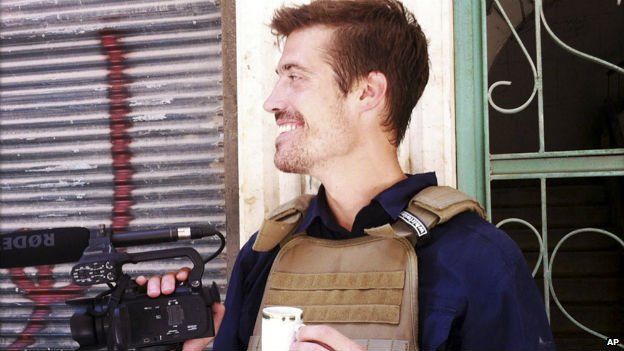James Foley killing betrays Britain, says Philip Hammond
- Published

The killing of a US journalist by an Islamic State militant who could be from the UK is "an utter betrayal of everything the British people stand for", the foreign secretary has said.
Writing in the Sunday Times, Philip Hammond said the government was investing "significant resources" to tackle "a barbaric ideology".
He said the threat from conflicts in Syria and Iraq could last a generation.
It comes as Downing Street said it had appointed a new security envoy to Iraq.
A spokesman said the posting to the Kurdistan region of the country showed the government was "stepping up" its efforts to help Iraq defeat Islamic State (IS) militants operating in the area.
Work is under way to supply "non-lethal equipment" to Kurdish forces who are battling IS in the coming days, including night vision equipment and body armour, the spokesman added.
'Heinous act'
UK authorities are seeking to identify the jihadist with an English accent who appeared in footage of the killing of journalist James Foley earlier this month.
Extremist group IS published a video of the moments before and after the apparent beheading of Mr Foley, who was seized in Syria in 2012.
In his Sunday Times article, the foreign secretary said: "It is horrifying to think that the perpetrator of this heinous act could have been brought up in Britain.
"It is an utter betrayal of our country, our values and everything the British people stand for."
More than 500 British citizens are thought to have travelled to Syria and Iraq to fight in the past few years.
Mr Hammond said the UK had assisted Kurdish Peshmerga fighters with military aircraft delivering equipment.
He said Britain would also start sending eastern European ammunition and weaponry.
The government also announced Lt Gen Sir Simon Mayall, its senior defence advisor for the Middle East, as the new security envoy.
"Gen Mayall's extensive experience of the region means he will be able to draw on a broad range of existing relationships across Iraq, the region and with close allies," No 10 said.
The spokesman said Gen Mayall would travel to Iraq next week to meet political leaders in Baghdad and the regional government in Irbil, Kurdistan's capital, "to encourage all Iraqi communities to unite together" against IS.
Shadow home secretary Yvette Cooper, also writing in the Sunday Times, called for a stronger domestic response.
"More must be done to stop British citizens joining the barbarism and to keep the country safe if they return," she said.
And she called for more action "to disrupt the travel plans of those planning go out to fight through better monitoring of the borders' watch list as well as access to passports".
The Home Office said police, security services and the Border Force were working to identify, detect and disrupt terrorist threats, including from British fighters attempting to return to the UK.
As well as passport checks, passengers travelling into the UK were checked against "watch lists", a spokesman added.
"The UK uses the most advanced technology in Europe to ensure we collect passenger information on 95% of flights, which helps us to identify individuals who pose a threat before they fly."
Mrs Cooper also urged Home Secretary Theresa May to "rethink her decision four years ago to end control orders and replace them with the weaker Terrorism Prevention and Investigation Measures Act".
TPims are used to restrict movement, the use of computers and mobile phones and meetings with others. They replaced the previous, more-restrictive system of control orders.
On Saturday, Mrs May said the government was looking at new powers to tackle the threat of extremism in Britain.
'Bloodthirsty skills'
Senior Conservative MP David Davis, meanwhile, said the TPims were "completely useless".
"What happens with them is that all the dangerous villains get away - they leave the country, go off back to Pakistan or now to Iraq," he told BBC Radio 4's The World This Weekend.
He added: "We should be using the law, we should be using prosecution, we should be locking people up if they are breaking the law - not doing these other halfway house measures and trying to go around the law."
And he called for British jihadists to be stripped of their UK citizenship.
"These people are now effectively swearing allegiance to a proto-state - a criminal proto-state.
"If they all come back they - 500-plus or 700 whatever it is - will undoubtedly create a very, very serious threat within the UK."
The government should give courts the right to say "they no longer have the protections and rights" of British citizenship, he added.
Writing in the Mail on Sunday, former Archbishop of Canterbury Lord Carey made a similar point.
"They should not have access to the privilege of travelling under a British passport," he said, adding "and they certainly should not be able to travel back with the barbaric and bloodthirsty skills they have gained".
- Formed out of al-Qaeda in Iraq (AQI) in 2013, IS first captured Raqqa in eastern Syria
- By early 2014, it controlled Falluja in western Iraq
- Has since captured broad swathes of Iraq, seizing the northern city of Mosul in June
- Fighting has displaced at least 1.2 million Iraqis
- Pursuing an extreme form of Sunni Islam, IS has persecuted non-Muslims such as Yazidis and Christians, as well as Shia Muslims, whom it regards as heretics
- In July alone, IS expanded dramatically, recruiting some 6,300 new fighters largely in Raqqa, an activist monitoring group said